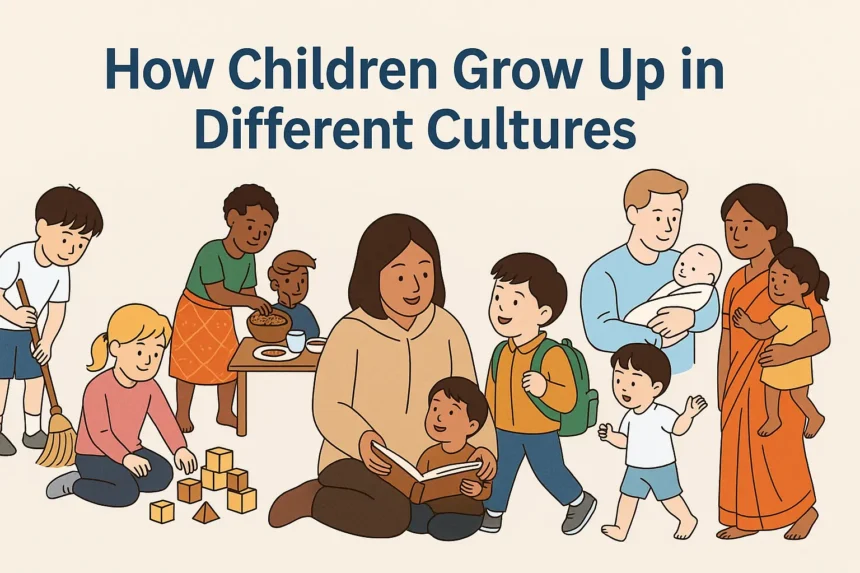How Children Grow Up in Different Cultures: A Global Perspective on Childhood
Have you ever wondered how different your childhood would have been if you were born in another part of the world? From daily routines to discipline, what’s considered “normal” for kids varies wildly across cultures—and some of these differences are truly eye-opening.
In this article, we’ll take you on a fascinating journey across the globe to uncover 10 surprising ways children grow up in different cultures. Get ready to rethink everything you thought you knew about parenting!
1. Japanese Kids Clean Their Schools—Literally!
In Japan, it’s common for children to grab a broom and sweep their classrooms at the end of the day. There’s even a dedicated time called osoji (cleaning). Instead of relying on janitors, kids learn responsibility, teamwork, and respect for shared spaces. Imagine if your school day ended with a cleaning session instead of recess!
2. In Finland, Homework is Minimal—and Play is Everything
Finland’s education system is often praised, and one of its secrets is less homework, more playtime. Kids attend school for fewer hours and enjoy long recess breaks. Research shows that this approach reduces stress and improves learning outcomes. Maybe less really is more!
3. In Kenya, Kids Learn from the Community, Not Just the Classroom
In many Kenyan villages, learning is deeply communal. Children learn life skills like herding, farming, cooking, and caring for siblings by watching and helping adults. There’s a strong emphasis on “learning by doing” instead of sitting in a classroom all day.
4. French Kids Eat Gourmet Meals at School
Forget peanut butter and jelly—French school lunches look more like fine dining. Meals are balanced, nutritious, and often served in multiple courses. Children are taught to eat slowly, try new foods, and appreciate taste. It’s about more than just nutrition; it’s a cultural lesson on refinement and gratitude.
5. Inuit Parenting: No Yelling, No Time-Outs
In Inuit communities in the Arctic, discipline is handled with remarkable calm. Instead of yelling or punishing, parents use storytelling and role-playing to correct behavior. The idea is to guide children with emotional intelligence—not fear. Surprising, right?
6. In China, Independence Starts Early—Even on the Commute
In many Chinese cities, it’s not unusual to see young children taking public transport alone. The culture places high value on self-reliance from an early age. While this might seem risky elsewhere, it’s normalized and often celebrated in China.
7. Sweden Offers Paid Leave for Both Parents
In Sweden, both parents get generous paid parental leave, and dads are encouraged to take “paternity days.” The idea is to support gender equality in parenting and give children more bonding time with both parents. It’s a progressive step that other countries are starting to admire.
8. In India, Joint Families Raise the Child
In many Indian households, it’s not just mom and dad raising the kids—it’s grandparents, uncles, aunts, cousins… everyone. The joint family system offers emotional support, shared responsibilities, and strong values. It’s a village raising a child, literally!
9. Dutch Babies are Some of the Happiest in the World
The Netherlands is often ranked as one of the best places to raise kids. Dutch babies are reported to cry less and sleep more—thanks to low-pressure parenting, lots of outdoor time, and a calm home environment. Happiness, it seems, starts young.
10. In the U.S., Individuality is Encouraged Early On
In the United States, children are often taught to express themselves and be independent from a young age. Choices—from clothes to school electives—are encouraged. While some cultures may view this as “too free,” others see it as empowering.
Final Thoughts: There’s No “One Right Way” to Raise a Child
These cultural differences show that parenting isn’t a one-size-fits-all concept. What works in Finland might not work in Kenya. But each method reflects deeper values—community, independence, respect, or joy. And that’s the beauty of diversity.
So the next time you think, “That’s not how we do things,” maybe pause and ask, “Could there be something to learn here?”
Subscribe to our newsletter to get weekly stories that open your mind and broaden your world.
Most read: https://tnheadlines24.com/7-brutal-steps-india-may-take/
Disclaimer: The content in this article is for informational and educational purposes only. Cultural practices and parenting styles vary widely and are presented here to encourage understanding and discussion. TN HEADLINES24 is not responsible for how this information is interpreted or applied by readers.

